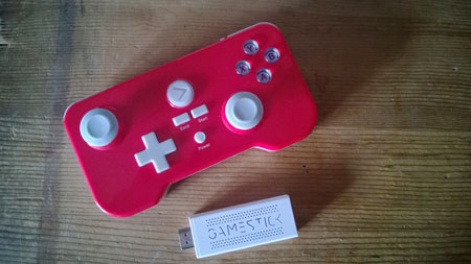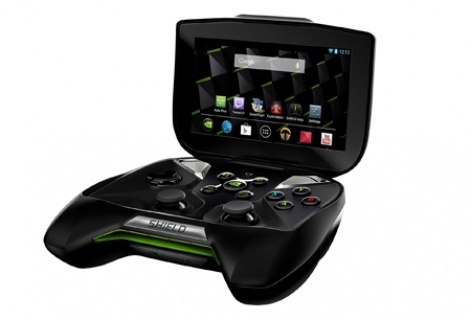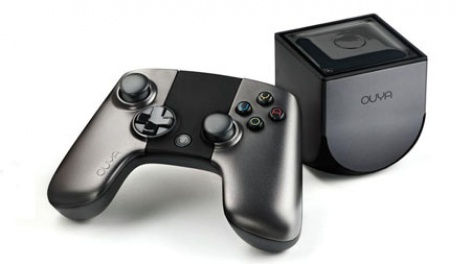Dr. Richard Wilson is CEO of TIGA, the trade association representing the UK's games industry.
There has been a wave of justifiable excitement about Xbox One and PlayStation 4.
Amidst the surge of interest by the national media in the video games sector, TIGA was asked by BBC Radio One to provide a point of view on the alternatives to the 'big three' of console gaming, specifically the handheld and micro-console market.
TIGA was very happy to oblige, not least because in the case of PlayJam's GameStick we have a British business that's launched a British games console and is selling it around the world: an exciting development given the need for a rebalancing of the UK economy towards investment and exports.
Furthermore, GameStick is based on chipset technology from ARM, the world's leading semiconductor intellectual property supplier and a major UK success story.
Thinking big
Game developers should investigate the micro-console market and consider whether it has potential for their businesses.
It is true that the audience will not be as big as Xbox One and PS4, platforms which TIGA also thinks UK developers should push for in the next 18 months if they can in order to capitalise on the pent-up demand for next gen gaming. Nor do these alternative gaming machines have the same history or budget as the big three.

However, micro-consoles are not necessarily competing with the top tier consoles. It is the mobile gaming experience that they are looking to bring to the TV screen, and in the case of Ouya and GameStick in particular, the Android experience.
Therefore, what might be more relevant is the size of the Android-powered smartphone install base, as opposed to the Wii's or the Xbox 360's.
What an audience it is too - Gartner estimates nearly a billion new Android handsets will have been sold in 2013 alone.
The living-room opportunity
Of course, the billion-dollar question is how many of those people like the idea of being able to play the mobile games they love on their TV when they get home?
In truth we do not know the answer to that. Yet you can see why the likes of Amazon are investigating micro-consoles too - you do not need a particularly high proportion of the Android user base to be doing very well indeed.
The micro-consoles are far and away the most affordable way to play 'mobile games', priced as they are between £80 to £100 ($130 to $160). This is considerably less than many Android phones and a quarter (or less) of the price of some top tier consoles.

Then there's the likes of the Nvidia Shield which costs $299 in the US, but is really more like a handheld PC, closer to PS Vita and is a dedicated handheld gaming machine, rather than a micro-console.
It is great to have a variety of products at a variety of price points because it all helps create a bigger global customer base for the UK games industry to sell to.
Rise of quality content
TIGA believes that competition is good: good for consumers, good for the market and good for developers/digital publishers.
The variety of console alternatives becoming available means that console providers will be competing against one another for developers to make content available for them. This could give developers more bargaining power when it comes to monetisation, support and revenue share.
At present the standard rate of 70 percent for the developer and 30 percent for the console provider, e.g. GameStick or Ouya, seems to be the norm.
Ultimately, if a developer is making an Android game anyway, it might be sensible to investigate porting it to micro-consoles as part of a general multi-platform strategy. It is relatively easy to do so, there are potential benefits in experimentation, and risk is potentially reduced by having a broader customer base.

From a technological standpoint you'd have to argue that the Android micro-consoles will be on par with mobile gaming, which has and continues to come on leaps and bounds. The point being there's no reason why the micro-console space can't become just as exciting as mobile in terms of innovation and creativity.
With the more powerful and more expensive handheld consoles like Nvidia Shield (or indeed PS Vita) you're talking about a superb, state-of-the-art handheld product - using the most powerful Android hardware on the market right now - integrated into a well-designed controller that ranks alongside the classic Xbox 360 pad in terms of ergonomics and response.
Also, whilst touchscreens have created new options in terms of game user interface - options that even now we haven't perfected or fully exploited - there could be many consumers who would like to play mobile or tablet games with a controller in their hand.
Some new
If your game is on a micro-console, then these mobile-game-loving-pad-preferers could be a new market you'd otherwise be unable to reach.
Also with joypads comes the opportunity to make games complex enough to require more sophisticated means of controlling them. That could make a big difference in reaching a bigger audience for micro consoles.
Innovation and experimentation are essential for any industry. The micro-consoles promote both of these virtues and so should be welcomed. Also, from a macro-economic perspective, given the need for the UK to encourage investment and exports, PlayJam's development of the GameStick comes at exactly the right time.
If the UK economy is to achieve higher and sustainable growth, then we need developers, investors, and manufacturers who are willing to take calculated risks, create new products and services and market them effectively.
Nothing ventured, nothing gained.





















